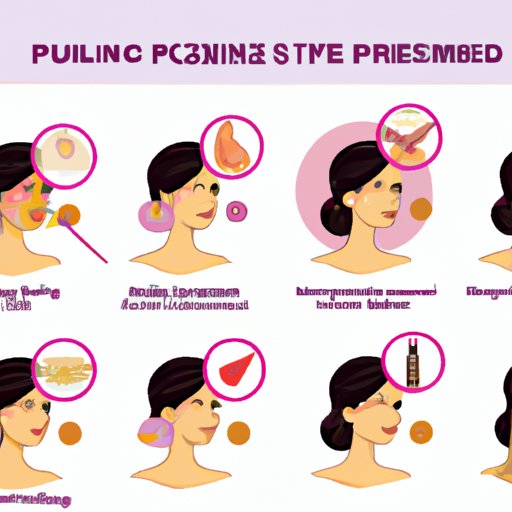
I. Introduction
Under the skin pimples, also known as cystic acne, can be frustrating and painful. Unlike surface-level pimples, cystic acne occurs deeper under the skin’s surface and takes longer to heal. This article will provide practical tips and solutions for getting rid of under the skin pimples and preventing them from recurring.
II. Natural Remedies for Under the Skin Pimples
Natural remedies are preferred among many individuals because they don’t contain harsh chemicals that may be harmful to the skin. Effective natural remedies for under the skin pimples include tea tree oil, aloe vera, and green tea. Tea tree oil has anti-inflammatory and antimicrobial properties that help kill bacteria and reduce inflammation. Aloe vera contains antioxidants and vitamins that soothe the skin and help reduce redness. Green tea is rich in antioxidants that help protect the skin from damage and reduce inflammation. While natural remedies are generally safe, they may not be suitable for everyone. It’s important to consult a dermatologist before using any new natural remedies to avoid potential allergic reactions or skin irritation.
III. Tips to Prevent Under the Skin Pimples from Occurring
Several factors can cause cystic acne, including hormonal imbalance, improper diet, and using pore-clogging products. To prevent under the skin pimples from occurring, it’s important to maintain a proper diet, use non-comedogenic skincare products, and avoid touching the face. Foods that are high in sugar, dairy, and refined carbs can trigger breakouts, and it’s essential to minimize or eliminate them from your diet. Non-comedogenic products are less likely to clog pores and cause acne, making them ideal for individuals prone to cystic acne. Touching the face with dirty hands, hair, or objects can transfer bacteria and dirt, leading to acne.
IV. Managing Under the Skin Pimples with a Healthy Lifestyle
Lifestyle changes such as regular exercise, adequate sleep, and stress management can improve overall health and help reduce cystic acne. Exercise promotes blood flow and oxygen to the skin, which helps reduce inflammation and promotes healing. Sufficient sleep allows the body to rest and recover, replenishing the skin’s natural oils and reducing the severity of acne. Stress is a significant factor that contributes to acne, and it’s crucial to manage stress levels effectively. Stress management techniques such as deep breathing, yoga, and meditation can help reduce stress-induced acne.
V. Pros and Cons of Over-the-Counter Solutions for Under the Skin Pimples
Over-the-counter solutions such as benzoyl peroxide and salicylic acid are popular and effective in treating cystic acne. Benzoyl peroxide works by killing bacteria on the skin’s surface and unclogging pores. Salicylic acid helps slough off dead skin cells, which can clog pores and lead to acne. Over-the-counter solutions are accessible and easy to use, but they may not be suitable for individuals with sensitive skin. Benzoyl peroxide can irritate or dry out the skin, and salicylic acid can cause burning or stinging. It’s essential to test these products on a small area of skin before applying them to the entire face.
VI. Dermatologist-Recommended Treatments for Under the Skin Pimples
If natural remedies, prevention tips, and over-the-counter solutions aren’t effective in treating cystic acne, it’s essential to consult a dermatologist. Dermatologists can prescribe prescription medication such as antibiotics, retinoids, and corticosteroids, which are effective in treating acne. Antibiotics work by killing bacteria and reducing inflammation, retinoids help reduce oil production, and corticosteroids reduce inflammation. While these treatments are effective, they require close monitoring by a dermatologist and can have side effects such as dryness, peeling, and skin thinning.
VII. Importance of Consistent Skincare Routine to Combat Under the Skin Pimples
Consistent skincare is essential in combatting cystic acne. Cleansing, toning, and moisturizing the skin regularly helps remove dirt and excess oil that can clog pores and cause pimples. Cleansing removes dirt and oil, while toning helps restore the skin’s natural pH balance, and moisturizing hydrates the skin and prevents overproduction of oil. It’s essential to use products that are suitable for your skin type and avoid over-cleansing or over-exfoliating, which can irritate the skin and cause acne.
VIII. Examining the Psychological Impact of Under the Skin Pimples and Methods for Managing Stress and Anxiety Related to Acne
Acne can be emotionally distressing and affect self-esteem, relationships, and personal life. It’s crucial to manage stress and anxiety related to acne effectively. Several methods can help, such as mindfulness exercises, support groups, and open communication with loved ones. Mindfulness exercises such as deep breathing, yoga, and meditation can help reduce stress and anxiety levels. Support groups provide a safe and empathetic space to share experiences and feelings related to acne. Open communication with loved ones promotes a sense of acceptance and understanding amidst the stigma surrounding acne.
IX. Conclusion
Getting rid of under the skin pimples can be challenging, but it’s possible with the right solutions and tips. Natural remedies, prevention tips, lifestyle changes, over-the-counter solutions, dermatologist-recommended treatments, consistent skincare, and stress management techniques can all help prevent and treat cystic acne. It’s essential to take action and see a dermatologist if necessary, as they can provide specialized and personalized advice tailored to individual needs. By following these tips and solutions, individuals can manage acne and improve their overall confidence and well-being.




